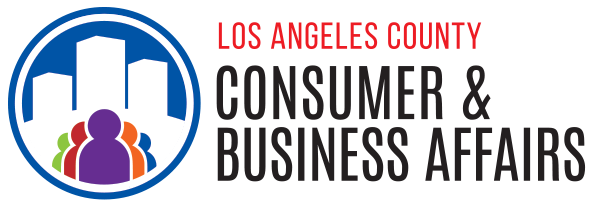The Los Angeles County Department of Consumer and Business Affairs (DCBA) is proud to recognize World Elder Abuse Awareness Day on Tuesday, June 15, 2021. On this day and every day, DCBA wants to share information and helpful tips to raise awareness of the many types of elder abuse.
Elder Abuse can occur in all socioeconomic groups, races, cultures and can include neglect and isolation, physical/sexual abuse, financial abuse or exploitation, and emotional abuse. It is important to safeguard the well-being of older adults in the Los Angeles County community and spread awareness of the many types of scams and financial exploitation to which older adults may be vulnerable.
Help Your Loved Ones Become Smarter Seniors!
DCBA has launched its new online home for consumer protection information just for LA County’s older adults. You can find tips and videos to help you avoid scams and elder financial abuse. You can also find a resource guide to connect with trustworthy agencies learn about upcoming Smarter Senior Forums, where you can gain in-depth information about important topics. Visit dcba.lacounty.gov/smarterseniors.
LA County Can Help
DCBA’s consumer protection experts can help keep LA County’s older adults from becoming victims of elder financial abuse. If you believe you have been a victim of a scam, you can contact DCBA at (800) 593-8222.
To report suspected elder abuse, contact the Adult Protective Services hotline at (877) 477-3646.
Protecting Your Property and Identity
Older adults can be tricked into signing a Grant Deed, Quitclaim Deed, essentially transferring ownership of the property to the abuser or scammer. Do not sign anything before reading and understanding the document as people you may least expect might coerce you into doing so. A living trust also be used as a tool to scam older adults. Contact DCBA’s Foreclosure Prevention unit for help.
- Sometimes family members may convince you to transfer the property out of your name in order to obtain certain government benefits or if you are facing financial difficulties.
- Property transfers such as signing a Grant Deed or Quitclaim Deed have the potential to affect the legal rights and obligations of the parties involved.
- Reversing a transfer may require legal action especially if the grantee is unwilling to deed the property back voluntarily.
- Before entering a transaction involving a Grant Deed or Quitclaim Deed, the parties should consult with an attorney.
- Grant Deed: A grant deed is a legal document that is used to transfer ownership of real property. The grantor is the person transferring the property, and the grantor must sign the deed. A Grant Deed is an official record that confirms ownership of a property. The grant deed must be signed and notarized in order to provide evidence that the deed is genuine and not forged. The Grant Deed must also include a legal description of the property.
- Quit Claim Deed: A Quit Claim Deed is a legal document that is used to transfer any interest in real property that the grantor may have. It contains no warranties of any kind. Read more about Quit Claim Deed theft here: More information about Quit Claim Deeds
- Living Trust: Creating a living trust can be very beneficial for an older adult to ensure that their assets are safeguarded with a responsible family member or friend that can make financial decisions on their behalf, in case you lose mental competency and can no longer manage their own assets.
Avoiding Financial Fraud and Identity Theft
- Co-signing: When you are co-signing a loan, you are being asked to guarantee a debt. If the borrower does not pay the debt, you will have to. You may have to pay up to the full amount of the debt if the borrower does not pay. Many seniors become liable for car loans when their family members, caregivers, or others convince them to co-sign for the purchase or the lease of a car and fail to make the payments.
- Identity Theft: Occurs when someone is using your personal information to open accounts, file taxes, or make purchases. Very often, the seniors’ family members or caregivers use the seniors’ personal information to open up credit cards in their names and put charges on those credit cards. To avoid becoming a victim of identity theft, you should be protective of your personal information and order your credit reports on a regular basis. Please contact DCBA if you find discrepancies in your credit reports. Put a security freeze on your credit files to minimize the possibility of becoming a victim of identity theft. If you are a victim of identity theft, file a report with your local law enforcement agency and file a complaint with the Federal Trade Commission.
- Power of Attorney: Creating a power of attorney (POA) is a way to appoint a substitute decision maker who is called your agent. You may need the assistance of an attorney to create a power of attorney. A financial power of attorney can be used if you need someone to make financial decisions for you. When a power of attorney is used for advanced planning, it is called a durable power of attorney which means it continues to be effective if the creator becomes incapacitated. You should appoint someone you trust as your agent and make sure that they know your wishes and preferences. Make sure that your family members, friends, and financial advisers know about your POA. If you find your agent is not the best person to handle your finances, you can revoke your power of attorney and create a new one. More information about a Power of Attorney
- Investments: Be careful when a friend or family member approaches you and asks you to borrow money or invest in a business or real estate transaction. It may sound convincing since you are being told you will get your money back plus interest or may get a large stipend. Unfortunately, if the plans don’t work out you may not recover the money you loaned or invested.
- Borrowing from the equity in your home: You may have paid off your home mortgage or owe little on it. Be cautious when borrowing against the equity of your home and not being able to repay the borrowed amount which is secured against your property. If you are unable to repay the secured debt, the lender can foreclose on your property.
- Reverse Mortgages: If your home is paid off and you need help paying for your property taxes and home insurance, including day to day expenses. You may want to consider inquiring into obtaining a Reverse Mortgage which can allow you to borrow money from your property with no payment requirements. Keep in mind that the money you borrow will be taken from the equity of your home. More information about reverse mortgages.

